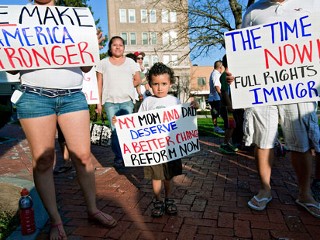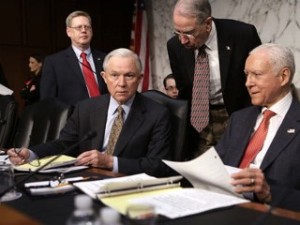Written by Dr. Ruben Martinez – from the NEXO Newsletter Spring 2013
Millions of people are waiting for the U.S. Congress to find the will to move forward with constructive and humane legislation on immigration reform. Yet, our congressional members, who receive minimum salaries of $174,000 paid by taxpayers, are seemingly unable to arrive at a policy direction that will serve the citizenry and the Public Good. The ideological intransigence of many legislators blinds them to the purpose and role that attend election to public office. One has but to recall the Preamble to the Constitution to regain a sense of what our government is about:We the people of the United States, in order to form a more perfect union, establish justice, insure domestic tranquility, provide for the common defense, promote the general welfare, and secure the blessings of liberty to ourselves and our posterity, do ordain and establish this Constitution for the United States of America.
It is increasingly difficult to believe that most of our elected legislators keep this statement front and center as they set about their daily duties to represent the good of the nation. Reactionary ideologies and the complexities of social and economic change over the past several decades make it even more difficult for legislators to find their way through a maze of myriad policy challenges that confronts the nation. This is especially the case for those who adopt extremist ideologies that provide facile solutions to contemporary challenges, such as immigration policy. In such a politically divided environment, one where increasingly money and not concern for the Public Good seems to matter most, legislators are continually posturing to gain media attention as they pursue their ideologically-driven objectives.
With the liberalization of international markets through “free trade” p[olicies, such as the North American Free Trade Agreement (NAFTA), has come the displacement of millions of people across the globe. In our own country, the runaway plant phenomenon of the last quarter of the 20th century resulted in the decline of manufacturing and the return of low wages to what remains of the manufacturing sector. South of us, the impact of runaway plants and NAFTA on Mexico’s maquiladora industry and small farmers triggered displacement and migration across national boundaries. People without the wherewithal to earn a living where forced to seek out opportunities outside their home country, and in cond itions of dire economic straits, they did not wait around for bureaucracies to provide the proper documents; they would have starved to death had they don so. Like the rest of us, displaced peoples have to make a living; they have to eat, secure shelter and stay healthy if they are to enjoy the short time that they have here on earth. Like us, this is their time on this earth-beyond subsistence. Moreover, they are not islands-through remittances, their work here contributes to the livelihood of family members in their home countries, where communities have been devastated by economic change and out migration.
itions of dire economic straits, they did not wait around for bureaucracies to provide the proper documents; they would have starved to death had they don so. Like the rest of us, displaced peoples have to make a living; they have to eat, secure shelter and stay healthy if they are to enjoy the short time that they have here on earth. Like us, this is their time on this earth-beyond subsistence. Moreover, they are not islands-through remittances, their work here contributes to the livelihood of family members in their home countries, where communities have been devastated by economic change and out migration.
The complexities of achieving a constructive and humane comprehensive immigrant policy that meets the exigencies of today are bound up with nativistic sentiments, racism, xenophobia, and ignorance. too many people simply don’t understand that the current national economic structure has become obsolete; the realities of globalization have already transformed national interests and closing the border is akin to marching backwards into the future. Indeed, it may be that present day concepts of immigration are impractical at best (useless at worst) and that we may be better off talking about transnational labor and the policies required to secure the human, civil, and labor rights of workers crossing national boundaries. That is, workers who move about the globe following capital in its pursuit of production and market opportunities. If capital moves across the globe, it is only reasonable to believe that labor will follow. As capital operates in a global economy, so too does labor. the challenge is to find ways to facilitate the movement of workers and to address human, labor and civil rights at a universal level. An important step in that direction is to begin to effectively address the issues associated with the 11 million persons who are in the United States without proper documentation.
The way our legislators have responded to the needs of undocumented transnational workers has not only been a failure but also inhumane in it effects. We have separated families, traumatized and destroyed lives, criminalized and incarcerated men and women while building a system of private prisons for them, and have watched idly as human trafficking and misery have swelled in our society. And still, despite the widespread human misery their inaction has perpetuated, many legislators oppose a sensible, humane immigration policy – one that will have at its core two provisions: 1) provide a pathway to citizenship for the undocumented; and 2) reunite families. To stand for border enforcement as the core of immigration policy is to bow to the influence of private economic interests that profit at the expense of human misery. To stand for the border enforcement is to separate families and trap the undocumented in exploitable situations here in this country, thereby lessening our civilized society as each day goes by without humane comprehensive immigration reform legislation. To stand for border enforcement is to continue to waste taxpayer monies beyond those wasted through the inaction of paid legislators. To stand for border enforcement as the core of immigration policy is to perpetuate human misery. Millions continue to wait as our paid legislators muddle their way through the demands of serving the nation and the Public Good.

PHOTO: Sen. Chuck Grassley, R-IA, leans down to talk to Sen. Jeff Sessions, R-AL, 2nd right, and Sen. Orrin Hatch, R-UT, right, prior to a hearing before the Senate Judiciary Committee, April 19, 2013, on “Comprehensive Immigration Reform Legislation” on – ABC News
Today the nation waits for immigration reform. Polls have shown over and over again that the majority of citizens favor a pathway to citizenship. They have shown that small business owners support a pathway to citizenship and keeping families together. Small business owners recognize and understand the importance of immigration for their businesses. And, with the focus on small business development as the main approach to rebuilding the nations’s economy, it would behoove legislators to listen to small business owners. Indeed, it would behoove them to listen to the citizenry, which is tired of the blind faith in free market fundamentalism exhibited by many legislators, and which calls for a return to a balanced and pragmatic approach to policy-making that keeps the Public Good front and center.
To learn more visit the Julian Samora Research Institute website: http://jsri.msu.edu
